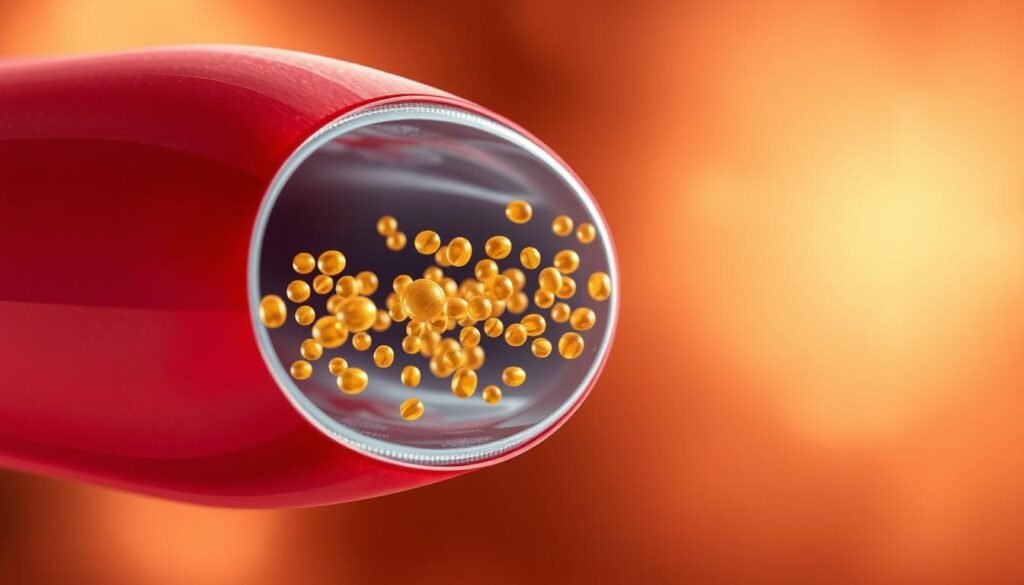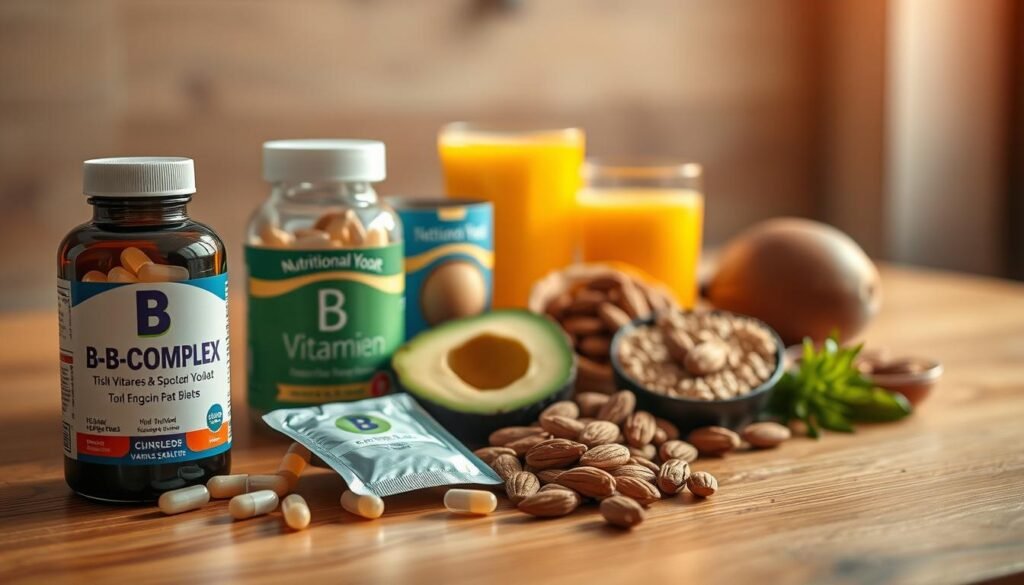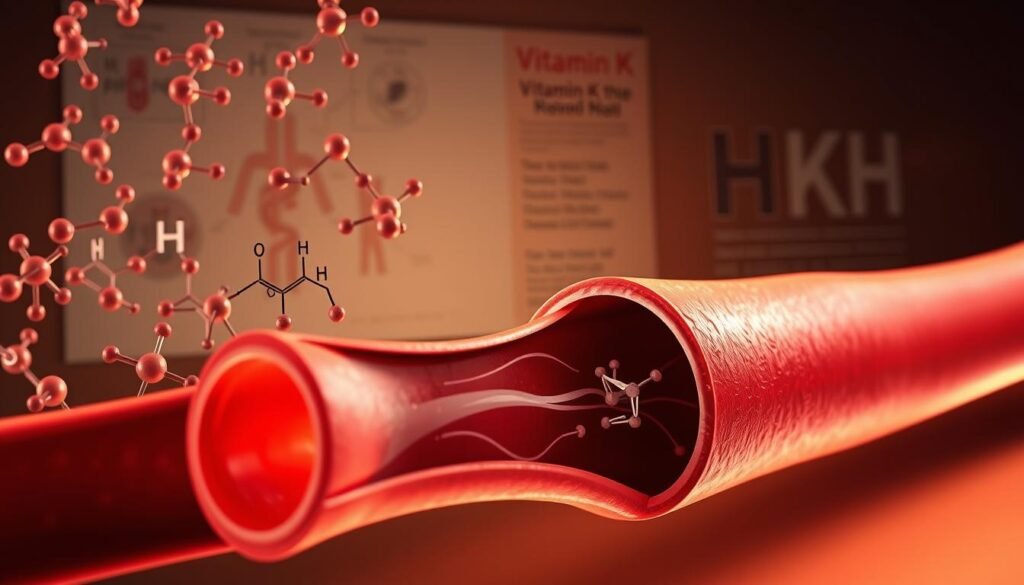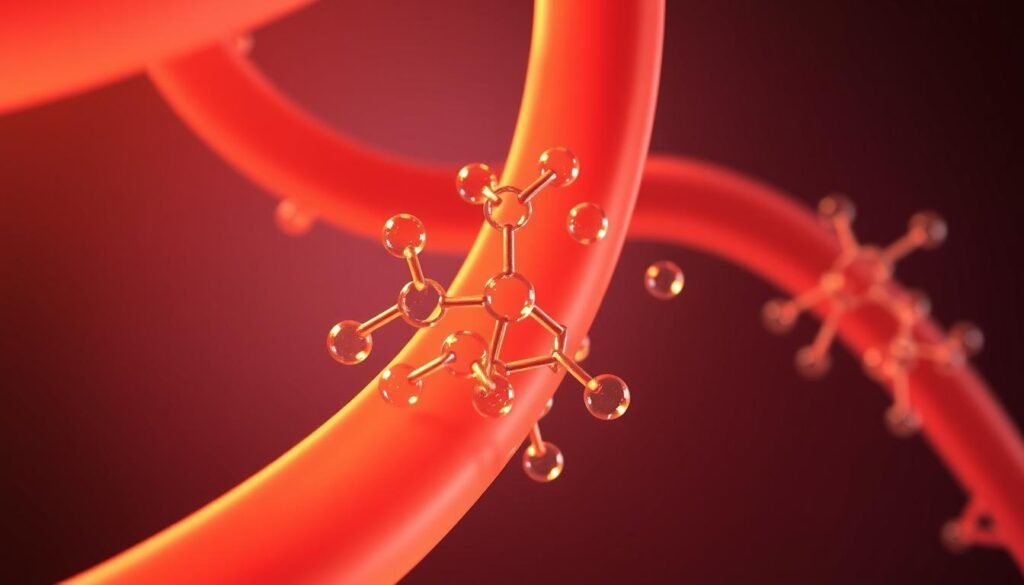Did you know that nearly 40% of adults in the United States suffer from vascular disease? This can cause poor circulation, varicose veins, and heart problems. Keeping your blood vessels strong is key for your body’s health. It helps your tissues and organs get the oxygen and nutrients they need.
As you get older, your blood vessels can weaken. It’s important to take steps to keep your vascular health strong. Some nutrients and vitamins can help with circulation and vein health. In this article, we’ll look at the top 10 supplements to Strengthen Blood Vessels Naturally.
Key Takeaways
- Understanding the importance of vascular health
- Role of supplements in maintaining strong blood vessels
- Top nutrients and vitamins for promoting circulation and vein health
- Natural ways to boost vascular health
- Precautions to consider when taking supplements
The Science of Vascular Health: Why Strong Blood Vessels Matter
Vascular health is key to feeling good. It affects how well your body circulates blood and works. Your blood vessels carry blood, giving you oxygen and nutrients and taking away waste.
The Structure and Function of Blood Vessels
Blood vessels do more than just carry blood. They are important for heart health. The endothelium, a thin layer of cells, helps control blood flow and fights off infections.
Arteries are strong to handle high blood pressure. Veins are thinner and have valves to keep blood flowing the right way.
Common Blood Vessel Problems and Their Symptoms
Damage to blood vessels can cause big health problems. Atherosclerosis can lead to heart attacks and strokes. Varicose veins happen when vein valves don’t work right, causing pain and swelling.
Symptoms include leg pain, swelling, and visible veins. In bad cases, poor blood flow can cause ulcers.
How Supplements Support Vascular Integrity
Some supplements can help keep your blood vessels healthy. Vitamins C and E, omega-3 fatty acids, and more can help. They improve blood flow and fight inflammation.
Adding these supplements to your diet can help keep your blood vessels strong. This supports your heart health.
Vitamin C: The Essential Collagen Builder for Vessel Strength
Vitamin C is key for keeping blood vessels strong. It helps make collagen, a protein that gives vessels strength and flexibility. This lets them handle the blood flow pressure well.
How Vitamin C Supports Blood Vessel Integrity
Vitamin C helps make collagen, which is vital for fixing and keeping blood vessel walls healthy. It also has antioxidant qualities that protect blood vessels from damage. This damage can harm the inner lining of blood vessels.
With vitamin C, blood vessels stay flexible and strong. This lowers the chance of problems like varicose veins and atherosclerosis.
Recommended Dosage and Food Sources
Adults need 60-90 mg of vitamin C each day for health. But, some research says 500 mg a day might be better for blood vessels.
You can get vitamin C from foods like oranges, strawberries, kiwis, and spinach. Eating these can help keep your blood vessels healthy.
Scientific Evidence for Vascular Benefits
Many studies show vitamin C is good for blood vessels. It can make blood flow better, lower blood pressure, and improve overall health. For example, it can help people with peripheral artery disease feel better.
Knowing how vitamin C helps blood vessels, you can eat right and maybe take supplements. This can help keep your blood vessels in top shape.
Vitamin E: Antioxidant Protection for Vessel Walls

Vitamin E is a key nutrient for healthy blood vessels. It protects cells from damage by free radicals. This helps keep blood vessels healthy.
Preventing Oxidative Damage
Oxidative damage harms blood vessel walls. Vitamin E’s antioxidant properties fight free radicals. This keeps vessels strong.
“Vitamin E is key for cell membrane protection,” it’s vital for blood vessel health.
Optimal Intake Levels and Natural Sources
Adults need 15 mg (22.4 IU) of vitamin E daily. You can get it from:
- Nuts and seeds, like almonds and sunflower seeds
- Vegetable oils, like wheat germ oil and sunflower oil
- Leafy green vegetables, including spinach and broccoli
Eating these foods helps you get enough vitamin E for your blood vessels.
Research on Vitamin E and Circulation Improvement
Many studies look at vitamin E and blood flow. Vitamin E protects vessel walls from damage. A study showed vitamin E improves blood flow and circulation.
Knowing how vitamin E helps blood vessels, you can support your health. Make smart food choices and consider supplements.
B Vitamins: Essential Nutrients for Supplements to Strengthen Blood Vessels

B vitamins are key for keeping blood vessels healthy. They help improve blood flow and vessel function. This is vital for a strong heart.
Improving Circulation and Vessel Function
B vitamins help in many ways. They lower homocysteine levels in the blood. B6, B9 (folate), and B12 are important for this.
They also help make nitric oxide. This molecule makes blood vessels relax and widen. It’s good for blood flow and blood pressure.
Key B Vitamins for Vascular Health
Some B vitamins are more important for blood vessels:
- B3 (Niacin): It improves blood fats and helps blood vessels relax.
- B6: It helps with homocysteine and keeps blood vessels healthy.
- B9 (Folate): It lowers homocysteine and keeps the blood vessel lining healthy.
- B12: It helps make fatty acids and supports the heart.
Dietary Sources and Supplement Recommendations
You can get B vitamins from food. Foods like:
- Leafy greens and legumes for folate
- Meat, fish, and poultry for B6 and B12
- Whole grains and cereals for many B vitamins
If you can’t get enough from food, supplements help. Look for a B-complex supplement.
Always talk to a doctor before taking supplements. They make sure it’s right for you and safe with your medicines.
Vitamin K: The Critical Nutrient for Vessel Calcification Prevention

Understanding Vitamin K’s role in preventing vessel calcification is key to vascular health. Vitamin K is a group of vitamins that helps with blood clotting and bone health. It also plays a big part in keeping our blood vessels healthy.
Regulating Calcium in Blood Vessels
Vitamin K helps control calcium in the body. It makes sure calcium goes to bones and teeth, not arteries. This is important because too much calcium in arteries can lead to heart disease.
Matrix Gla protein (MGP) is a Vitamin K-dependent protein. It stops arteries from getting too much calcium. When Vitamin K levels are good, MGP works well, keeping arteries healthy.
Having enough Vitamin K is vital for our blood vessels. Without it, arteries can get too much calcium. This can cause atherosclerosis and heart problems.
K1 vs. K2: Which Form Is Best for Vascular Health
Vitamin K comes in two main forms: K1 and K2. K1 is in leafy greens and helps with blood clotting. K2 is in fermented foods and is better for our blood vessels.
Studies show Vitamin K2 is better for our blood vessels than K1. K2 helps activate proteins that stop arteries from getting too much calcium.
Food Sources and Supplementation Guidelines
Eating foods rich in Vitamin K is important for our blood vessels. Leafy greens like spinach and kale have K1. Fermented foods like natto and sauerkraut have K2.
If you need supplements, choose Vitamin K2, like MK-7. It’s more effective for blood vessels. The right dose is 45 to 185 mcg of MK-7 daily. But always talk to a doctor before starting supplements.
Omega-3 Fatty Acids: Anti-inflammatory Support for Vessel Health

Omega-3 fatty acids are key for keeping blood vessels healthy. They fight inflammation and help blood vessels work right.
Mechanisms Behind Omega-3’s Vascular Benefits
Omega-3 fatty acids, like EPA and DHA, help blood vessels in many ways. They cut down inflammation by stopping bad stuff from being made. This makes blood vessels work better and feel less stiff.
Key Mechanisms Include:
- Reducing inflammation
- Improving endothelial function
- Lowering triglycerides
- Modulating blood pressure
Fish Oil vs. Plant-Based Omega-3 Sources
You can get omega-3s from fish oil or plants. Fish oil has EPA and DHA. Plants like flaxseed and chia seeds have ALA, which turns into EPA and DHA.
| Source | Type of Omega-3 | Conversion Efficiency |
|---|---|---|
| Fish Oil | EPA, DHA | Directly available |
| Flaxseed/Chia Seeds | ALA | Variable conversion to EPA/DHA |
Fish oil is better for heart health because it has EPA and DHA directly.
Dosage Guidelines for Optimal Results
The right amount of omega-3s depends on your health and the product. A good dose is 1000-2000 mg of EPA and DHA daily for heart health.
Coenzyme Q10 (CoQ10): Energizing Vascular Cells
Your blood vessels need CoQ10 to work right. It’s a key supplement for blood vessel health. CoQ10 is a fat-soluble antioxidant that helps cells make energy, including those in your blood vessels.
Supporting Endothelial Function
The endothelium is a thin layer of cells in your blood vessels. It’s vital for your vascular health. CoQ10 supports endothelial function by boosting energy and reducing stress. This keeps your blood vessels strong and helps blood flow well.
Studies show CoQ10 helps endothelial function in many people, even those with heart disease. It boosts energy in endothelial cells. This helps control blood flow and pressure.
Ubiquinol vs. Ubiquinone: Forms and Bioavailability
CoQ10 comes in two forms: ubiquinone and ubiquinol. Ubiquinol is better for older adults or those with weak defenses. It’s more bioavailable and potent.
| Form | Bioavailability | Antioxidant Potency |
|---|---|---|
| Ubiquinone | Good | High |
| Ubiquinol | Excellent | Very High |
Research-Backed Benefits for Blood Vessel Health
Many studies show CoQ10’s benefits for blood vessels. It improves endothelial function, reduces stress, and boosts heart health. By energizing vascular cells, CoQ10 is key to keeping your blood vessels healthy.
When picking a CoQ10 supplement, look at the form and bioavailability. This ensures you get the best product for your blood vessel health.
Rutin and Bioflavonoids: Nature’s Vein Strengtheners
Nature has given us rutin and bioflavonoids to help our veins. They are key to keeping blood vessels healthy. These natural helpers are getting more attention for their role in capillary health and vein prevention.
How Bioflavonoids Enhance Capillary Health
Bioflavonoids, like rutin, make capillaries stronger and less leaky. This is important because weak capillaries can cause bruises and varicose veins. They keep our blood vessels in good shape.
Eating foods high in bioflavonoids can boost your vascular health. Some benefits include:
- Improved Capillary Strength: Bioflavonoids make capillaries less likely to get damaged.
- Reduced Inflammation: These compounds fight inflammation, easing vascular stress.
- Enhanced Overall Vascular Health: They support blood vessels, improving circulation and heart health.
Sources of Rutin and Related Compounds
Rutin is found in many fruits, veggies, and herbs. Some top sources are:
- Apples
- Onions
- Buckwheat
- Citrus fruits
- Tea
Eating these foods can give you rutin and bioflavonoid benefits.
Clinical Studies on Varicose Vein Prevention
Studies have looked at rutin and bioflavonoids for varicose vein prevention. They show these compounds can lower the risk of varicose veins. They do this by improving blood flow and reducing pressure.
A study in a medical journal found bioflavonoids help with varicose vein symptoms. Symptoms like pain and swelling were reduced. This shows rutin and bioflavonoids are natural vein strengtheners.
Grape Seed Extract and Pycnogenol: Powerful Antioxidants for Vessel Elasticity
Grape seed extract and Pycnogenol are full of OPCs. These help keep blood vessels healthy. They make blood vessels more elastic and improve blood flow.
The OPCs and Their Vascular Effects
OPCs in grape seed extract and Pycnogenol are good for blood vessels. They:
- Make blood vessels stronger
- Help blood flow better
- Lessen oxidative stress and inflammation
OPCs help keep your blood vessels healthy. This is good for your heart.
Recommended Supplementation Approaches
Choosing good grape seed extract or Pycnogenol is key. Look for products from trusted makers. The right dose varies, but here’s a general guide:
- 50-300 mg per day for grape seed extract
- 50-200 mg per day for Pycnogenol
Talk to a doctor to find the right dose for you.
Evidence for Circulation Improvement
Studies show grape seed extract and Pycnogenol boost blood flow. They:
- Help blood vessels work better
- Lower blood pressure in some people
- Improve blood flow and overall blood vessel health
Adding these antioxidants to your routine may help your blood vessels and circulation.
Conclusion: Building Your Personalized Blood Vessel Support Regimen
Now that you’ve looked at the best supplements for blood vessels, it’s time to make a plan for you. A good plan can improve blood flow and keep your veins healthy.
To make your plan, mix the supplements and nutrients that fit your needs. For example, Vitamin C, Rutin, and Bioflavonoids can help your capillaries. Omega-3 Fatty Acids and CoQ10 can fight inflammation and energize your blood vessels.
Before starting your plan, talk to a doctor. They can help you find the right amounts and mix of supplements. This way, you can keep your blood vessels healthy and feel your best.
FAQs
What are the most effective supplements to strengthen blood vessels naturally?
Top supplements for blood vessels include vitamin C, vitamin E, and B vitamins. Also, vitamin K, omega-3 fatty acids, and CoQ10 are good. Rutin, bioflavonoids, grape seed extract, and Pycnogenol also help. They boost collagen, reduce stress, and improve blood flow.
How does vitamin C support blood vessel integrity?
Vitamin C helps make collagen. This is key for strong and flexible blood vessels. It also fights off damage from free radicals.
What is the recommended dosage of vitamin E for vascular health?
Vitamin E dosage varies, but it’s usually 15-100 mg daily. Always talk to a doctor to find the right amount for you.
How do B vitamins improve circulation and vessel function?
B vitamins, like B3, B6, B9, and B12, are vital. They help blood vessels work better by improving flow and reducing homocysteine levels.
What is the difference between vitamin K1 and K2, and which is better for vascular health?
Vitamin K1 is in leafy greens and helps with blood clotting. Vitamin K2, found in fermented foods, is better for blood vessel health. It helps control calcium levels.
Can omega-3 fatty acids help reduce inflammation in blood vessels?
Yes, omega-3s are anti-inflammatory. They can lessen inflammation in blood vessels, boosting overall health.
What is the role of CoQ10 in supporting endothelial function?
CoQ10 is an antioxidant. It energizes cells and supports the lining of blood vessels. This improves health and reduces stress.
How do rutin and bioflavonoids strengthen veins and enhance capillary health?
Rutin and bioflavonoids improve capillary health. They reduce inflammation and make veins stronger. This helps prevent varicose veins and boosts overall health.
What are the benefits of grape seed extract and Pycnogenol for vessel elasticity?
Grape seed extract and Pycnogenol are full of antioxidants. They make blood vessels more elastic by reducing stress and promoting collagen. This improves circulation and overall health.
How can I combine these supplements to achieve optimal vascular health?
Mix supplements for different vascular health needs. Use vitamin C for collagen, omega-3s for inflammation, and CoQ10 for the lining. A doctor can help find the best mix for you.
Are there any dietary changes I can make to support vascular health?
Yes, eat foods rich in vitamins like citrus fruits, berries, and leafy greens. Fatty fish is also good. A balanced diet with supplements supports blood vessels well.
Can supplements help alleviate symptoms of peripheral arterial disease (PAD)?
Supplements like omega-3s, vitamin E, and CoQ10 may help PAD symptoms. They improve flow and reduce inflammation. Always talk to a doctor before starting supplements.
What are natural remedies for weak blood vessels?
Natural remedies for weak blood vessels include taking supplements like vitamin C, rutin, and horse chestnut. Eating antioxidant-rich foods and regular exercise also improve vessel strength.
How can I strengthen capillaries naturally?
Strengthen capillaries by consuming vitamin C, bioflavonoids, and rutin. Foods like berries, leafy greens, and citrus fruits naturally enhance capillary strength and health.
What supplements strengthen blood vessel walls?
Supplements such as vitamin C, vitamin E, CoQ10, and bioflavonoids help reinforce blood vessel walls. They enhance collagen production, reduce inflammation, and improve overall vascular integrity.
Which vitamins are best for strengthening blood vessels?
Vitamins C, E, K2, and B-complex vitamins are particularly beneficial. They boost collagen formation, enhance circulation, and help maintain the elasticity and strength of blood vessels.

